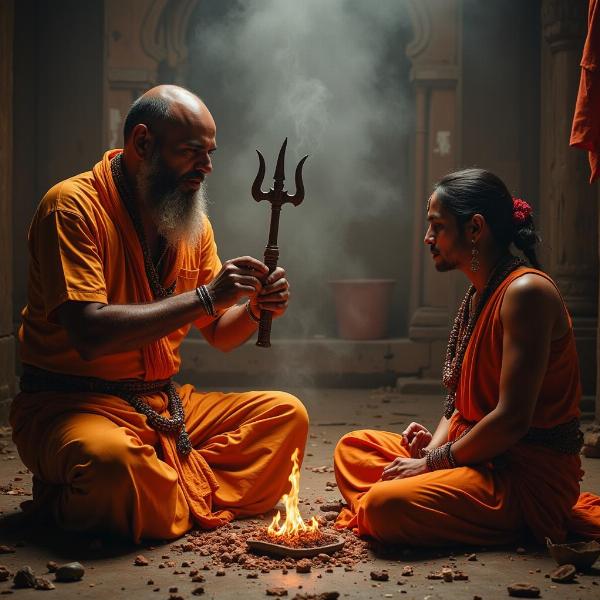Exorcism meaning in Hindi revolves around the practice of driving out evil spirits or malevolent entities from a person, place, or object believed to be possessed. This intricate ritual, steeped in tradition and belief, finds its roots in ancient Indian scriptures and continues to hold relevance in contemporary society. Understanding the nuances of exorcism in Hindi requires delving into the cultural, religious, and linguistic landscape that shapes this practice.
Understanding “Exorcism” in the Indian Context
The Hindi equivalent of “exorcism” can be expressed through several terms, each carrying its own specific connotations. Words like भूत-प्रेत निकालना (bhoot-pret nikalna) literally translate to “removing ghosts and spirits.” Other terms like झाड़-फूँक (jhaad-phoonk) and ओझा (ojha) refer to the specific rituals and practitioners involved. These terms highlight the belief in supernatural forces and the need for specialized individuals to mediate between the spirit world and the human realm.
While exorcism is often associated with Hinduism, similar practices can be found in other Indian religions and cultural traditions as well. This reflects the shared belief in the existence of malevolent entities and the power of rituals to combat them. The specific methods and beliefs, however, may vary depending on the particular tradition.
The Role of Rituals and Beliefs
Exorcism rituals in India are often elaborate and involve specific procedures, mantras, and offerings. The jhaad-phoonk ritual, for instance, typically involves burning incense, chanting mantras, and using specific hand gestures to dispel the negative energy. The ojha, often viewed as a spiritual healer, plays a central role in guiding the ritual and communicating with the spirits.
 Ojha Performing Exorcism
Ojha Performing Exorcism
The effectiveness of these rituals is believed to stem from the power of faith and the spiritual authority of the ojha. The belief in the supernatural and the fear of possession play a significant role in shaping the cultural understanding of exorcism. It’s important to acknowledge the deep-rooted cultural and religious significance these rituals hold for many individuals.
Exorcism and Mental Health
It’s crucial to differentiate between traditional exorcism practices and mental health issues. While some individuals may genuinely benefit from traditional healing practices, others might be suffering from psychological conditions that require medical attention. Misinterpreting mental health issues as spiritual possession can lead to delayed or inadequate treatment.
What are the signs of possession according to traditional beliefs?
Sudden changes in behavior, unexplained physical ailments, and speaking in unknown languages are often attributed to possession.
How can one differentiate between possession and mental illness?
Consulting with both a medical professional and a trusted spiritual advisor can help discern the root cause of the problem.
“In some cases, what appears to be spiritual affliction may actually be a manifestation of underlying psychological distress,” says Dr. Anisha Sharma, a renowned psychologist specializing in cultural psychiatry. “It’s essential to consider all possibilities and seek appropriate help.”
Conclusion: Exorcism in Hindi – A Complex Interplay of Culture and Belief
Exorcism meaning in Hindi encompasses a complex interplay of cultural beliefs, religious practices, and linguistic nuances. Understanding the various terms, rituals, and the role of the ojha offers valuable insights into this deeply rooted tradition. While respecting the cultural significance of exorcism, it’s equally important to acknowledge the potential for misinterpreting mental health conditions. A balanced approach involves considering both traditional healing methods and modern medical practices.
FAQs
- What is the most common term for exorcism in Hindi? भूत-प्रेत निकालना (bhoot-pret nikalna)
- Who performs exorcism rituals in India? An ojha or a spiritual healer.
- Is exorcism practiced only in Hinduism? No, similar practices are found in other Indian religions and cultural traditions.
- What is jhaad-phoonk? A common exorcism ritual involving burning incense, chanting mantras, and hand gestures.
- Can mental illness be mistaken for possession? Yes, it’s crucial to consider both spiritual and psychological factors.
- What should one do if they suspect someone is possessed? Consult both a medical professional and a trusted spiritual advisor.
- Are there any risks associated with exorcism rituals? It’s important to seek guidance from experienced and reputable practitioners to minimize potential risks.
Meaning-Hindi.in: Your Trusted Partner for Hindi Translations
Meaning-Hindi.in is a leading provider of professional Hindi translation services, catering to diverse needs ranging from business and legal documents to technical manuals and educational materials. Our team of expert linguists ensures accurate and culturally sensitive translations, bridging the language gap between Hindi and other languages. Whether you need website localization, certified translation, or quick turnaround times, Meaning-Hindi.in is your trusted partner. Contact us today for all your Hindi translation needs at [email protected] or +91 11-4502-7584.